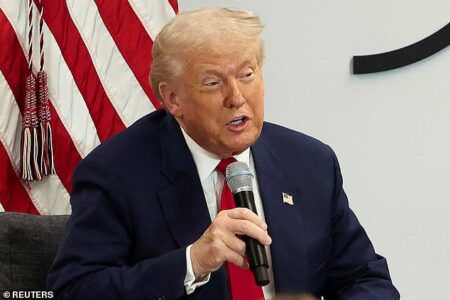No sooner had Rachel Reeves delivered her execrable Spring Statement than the fragile restoration of budgetary discipline was threatened from across the Atlantic.
Donald Trump’s imposition of a 25 per cent tariff on imported cars, the latest move in the President’s unfathomable trade war, is a direct hit on the UK economy.
The idea that low-octane Business Secretary Jonathan Reynolds can save Jaguar Land Rover and our other luxury car makers from the force of America’s current Europe-phobia is fanciful.
Keir Starmer, Reeves and colleagues peddle a narrative that the US has a modest trade surplus with Britain, and it doesn’t make much sense for the White House to target us.
That is true of physical goods such as UK car and steel exports. But the UK has a whopping surplus on the services – from insurance to transatlantic air travel – that it sells to America.
The notion that this won’t be noticed by US trade negotiators is preposterous.

Trade war: Donald Trump’s imposition of a 25% tariff on imported cars, latest move in the President’s unfathomable trade war, is a direct hit on the UK economy
Even if Britain’s US ambassador Lord Mandelson was able to use his oleaginous skills to persuade the White House that Britain is a special case, that doesn’t let us off the hook.
As one of the most open trading nations in the world, the UK can never isolate itself from what happens overseas.
I remember Gordon Brown’s anguish, at an early morning briefing in Washington in 1997, when he was required to lower the UK growth forecast because of the impact of the Asian financial crisis.
Reeves’s effort to blame low growth on global change in her Commons statement was wrong.
The wipeout of October Budget headroom on current spending was the result of elevated bond rates, which raised the cost of servicing the national debt beyond £100billion. Only now can trade events be cited as a factor.
The Office for Budget Responsibility (OBR) outlined on Wednesday how the UK might be affected by a beggar-thy-
neighbour trade policy. If the UK were to avoid the worst of the tariff wrath, then lower world activity could wipe 0.2 per cent off floundering growth.
Were the UK specifically targeted, then the loss of output could be as much as 0.6 per cent. There could be permanent loss of GDP of 0.3 per cent, inflation would be higher, and that might interrupt interest rate cuts.
Speculation is rife that ‘absurd tinkering’ in the Spring Statement means that a tax-raising Budget in the autumn is on the cards, adding to the domestic uncertainty.
Escaping the doom loop might be best achieved by unleashing business investment with targeted tax reliefs.
Retail royalty
There is no surprise that Next has upgraded its earnings outlook for the current year after joining the exalted club of £1billion-a-year profits. Few UK clothing retailers have achieved such a milestone.
It is particularly impressive having been achieved against a background of sluggish growth, dismal consumer confidence and dissonance on the High Street.
Next’s chief executive, Lord Wolfson, is never usually shy to weigh into the political sphere.
But he confined his latest criticisms to the impact of the Employment Rights Bill, which will penalise part-term working, and a new, green-driven packaging tax.
Wolfson’s personal stake in Next amounts to around one per cent of the shares. He joined the company (where his father Lord David Wolfson was chairman) as a stripling in 1991 and has been at the helm since 2001.
There appears to be no obvious family successor in a Wolfson family which over the decades has created a rich legacy of catalogue and online shopping, as well as luxury fashion group Burberry.
At 57, Wolfson has no immediate need to step back. Nevertheless, investors fret about succession. If he were to make room for a new chief executive, there may be a rare case for suspending governance rules and making Wolfson chairman.
Slow motion
One might have thought the Civil Aviation Authority (CAA), which regulates UK airports, would have moved in with the heavy guns immediately after the sub-
station fire brought Heathrow to a standstill a week ago. The incident shamed the UK’s hub airport.
The CAA belatedly has decided that it will look at the airport’s resilience as part of a regular review.
Time for the Government to probe the CAA’s own leadership and resilience.
DIY INVESTING PLATFORMS
Affiliate links: If you take out a product This is Money may earn a commission. These deals are chosen by our editorial team, as we think they are worth highlighting. This does not affect our editorial independence.


